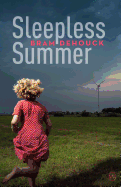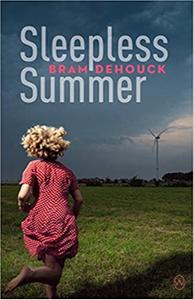
 In Bram Dehouck's Sleepless Summer, the arrival of a wind farm near the tiny Belgian town of Blaashoek precipitates a series of disturbing events leading to a hellish conclusion. Dehouck is a Belgian author who has received prestigious Dutch prizes for crime writing. Sleepless Summer--translated by Jonathan Reeder--might loosely be considered a crime novel or thriller, but it also has firm roots in horror. There is something Edgar Allan Poe-like in the inexplicable way the wind turbines tax some of Blaashoek's inhabitants, especially Herman Bracke, a butcher who blames his insomnia on an irritating hum coming from the turbines. As his insomnia continues, his fatigue worsens, eventually setting of a chain of events that progress from gross and odd to horrific.
In Bram Dehouck's Sleepless Summer, the arrival of a wind farm near the tiny Belgian town of Blaashoek precipitates a series of disturbing events leading to a hellish conclusion. Dehouck is a Belgian author who has received prestigious Dutch prizes for crime writing. Sleepless Summer--translated by Jonathan Reeder--might loosely be considered a crime novel or thriller, but it also has firm roots in horror. There is something Edgar Allan Poe-like in the inexplicable way the wind turbines tax some of Blaashoek's inhabitants, especially Herman Bracke, a butcher who blames his insomnia on an irritating hum coming from the turbines. As his insomnia continues, his fatigue worsens, eventually setting of a chain of events that progress from gross and odd to horrific.
Bracke is only one character out of more than a dozen efficiently sketched by the author in fewer than 200 pages. Though the novel eventually reaches a violent, arguably tasteless crescendo, it spends much of its brief duration establishing the characters' inner lives. Dehouck pays particular attention to each one's fears, resentments and insecurities, which provide the fissile material for the town's collapse into chaos. Saskia Maes, for instance, newly installed in Blaashoek's subsidized housing, is paralyzed by doubt and self-hatred born of a traumatic upbringing: "No, she had to face facts: she stood at the bottom of the social ladder. Not on the second rung, not even on the lowest one. She was a piece of lint under the mat where people wiped their feet."
Dehouck is merciless in uncovering the status anxiety and prejudices endemic in Blaashoek. The curmudgeonly pharmacist thinks of Saskia: "She looked fit and healthy enough to work. But apparently she chose to sponge off the government, to live off taxpayers' money, off people like him who earned an honest wage." The racial animus directed toward Bienvenue, a Senegalese asylum seeker, is even more malicious. Still, Sleepless Summer resists interpretation as an indictment of small-minded, provincial thinking. In fact, Dehouck seems to mock high-minded interpretations at the start of the novel: "Immediately following the tragic events, sociologists and psychologists scrambled to pinpoint the cause of this human cataclysm. Loneliness, cried one. Alienation, bellowed the next. Small-town insularity, opined the third. It was only a matter of time before a fourth would come up with inbreeding." The depths Sleepless Summers reaches are all the more disturbing if they cannot be explained away.
Roughly the first two-thirds of the novel can be read as a darkly comic take on a small town heading to disaster. Once the calamity begins in earnest, the reader's tolerance of gore, descriptions of bodily functions and senseless killing will be tested as the humor gets blacker and blacker. The town's freefall is inevitable, but when it occurs, the specific deadliness is hard to foresee. Sleepless Summers is determined to leave you with a sick feeling in the pit of your stomach, and its Coen Brothers-meets-Stephen King nightmare of an ending is sure to do the trick. --Hank Stephenson, bookseller, Flyleaf Books, Chapel Hill, N.C.
Shelf Talker: Sleepless Summer draws elements from crime fiction and horror to describe a small town's descent into chaos after the installation nearby of a wind farm.

